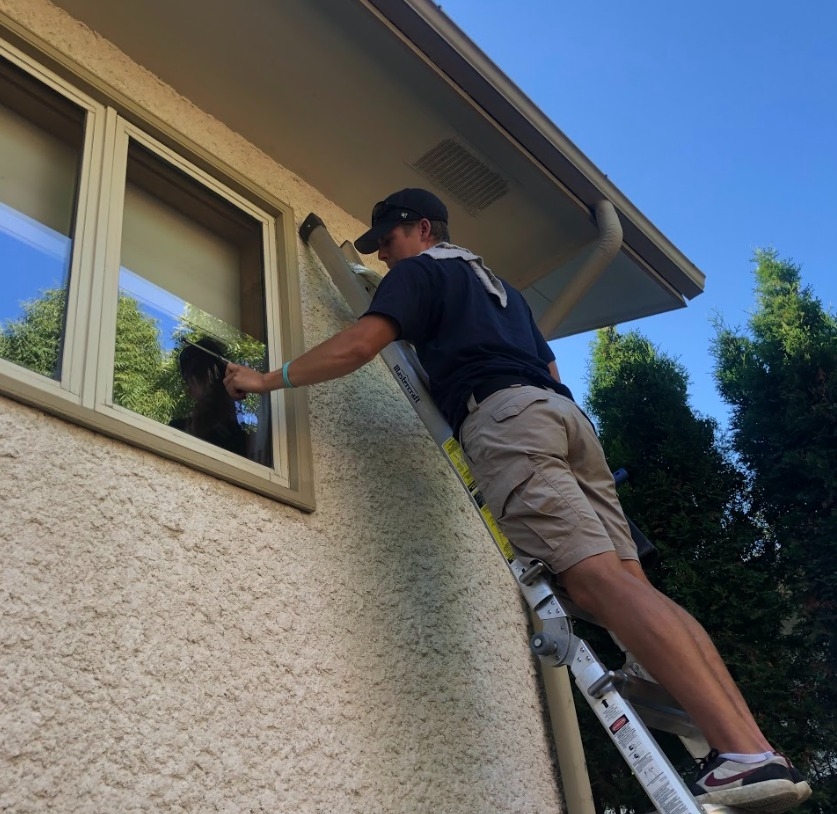
7 Best Homemade Window Cleaner Recipes (Natural & Effective)
Are you tired of cleaning your windows through dirty, streaked glass? The solution may be sitting in the kitchen cupboard. Commercial window cleaners can give you cleaves, but they often cost a lot of money and contain unpronounceable chemicals that leave behind toxic fumes.
Homemade window cleaner recipes can be made with safe, inexpensive products that you already have on hand, so they work as well as commercial cleaners without the discomfort of harmful fumes. The better news is, homemade window cleaner recipes cost a penny a bottle and give streak-free shine without harmful indoor air pollutants.
Are you ready to learn what natural ingredients can turn filthy glass into sparkling clean surfaces? Stay here and learn with Neighbours Windows!
Quick Reference
For those who want the essentials at a glance, here's everything worth remembering about homemade window cleaners:
White vinegar is the powerhouse ingredient that cuts through dirt, grease, and mineral deposits
Distilled water prevents mineral spots and streaking that tap water causes
Rubbing alcohol speeds drying time and enhances streak-free results
Dish soap tackles greasy buildup on kitchen windows
Cornstarch provides a gentle abrasive action for stubborn grime
Clean windows on cloudy days to prevent cleaner from drying too fast
Use microfiber cloths or crumpled newspaper instead of paper towels
Work from top to bottom in overlapping strokes
Always shake bottles before use, especially with cornstarch solutions
Test new cleaners on small areas first, particularly on tinted glass
Why Choose Natural Window Cleaners?
Before diving into the recipes, understanding why natural cleaners work helps make informed choices. Acetic acid in vinegar effectively breaks down minerals and grime, especially useful for removing hard water stains and mineral buildup common in areas with hard water.
The benefits extend beyond just cleaning power. Ditching chemical-laden products means breathing easier, literally. Using vinegar as an alternative to chemical store-bought cleaners prevents breathing in toxic and harmful fumes, with the added benefit of being streak-free.

Recipe 1. The Classic Vinegar & Water Cleaner
This timeless recipe remains the gold standard for everyday window maintenance. The secret lies in vinegar's acidity, which cuts through film and mineral deposits without leaving residue.
What's Needed
2 cups distilled water (prevents mineral spots)
1/4 cup white vinegar
Optional: 3-4 drops of lemon or peppermint essential oil
How to Make Vinegar & Water Cleaner?
Mix all ingredients in a clean spray bottle and shake gently. Spray directly onto the window surface and wipe with a lint-free microfiber cloth or crumpled newspaper for optimal results.
A mixture of one part distilled water to one part white vinegar works well for most windows, with distilled water preventing mineral deposits that cause streaking. The ratio can be adjusted based on how dirty the windows are; more vinegar for heavily soiled surfaces, less for light cleaning.
This solution works perfectly for interior windows, mirrors, and glass tabletops. The mild acidity tackles everyday dust, fingerprints, and light grime without damaging surfaces or leaving chemical residue behind.
Recipe 2. Fast-Drying Rubbing Alcohol Solution
When time matters and streak-free results are non-negotiable, rubbing alcohol becomes the secret weapon. This formula evaporates rapidly, making it ideal for quick cleaning sessions or sunny days when slower-drying solutions leave streaks.
What's Needed
1 cup distilled water
1 cup rubbing alcohol (70% concentration)
1 tablespoon white vinegar (optional booster)
How to Make the Rubbing Alcohol Solution
Combine all ingredients in a spray bottle and shake well before each use. Apply to glass surfaces and wipe immediately with a clean, lint-free cloth.
The alcohol's fast evaporation rate eliminates the common problem of the cleaner drying before wiping is finished. This solution also works exceptionally well in humid environments where other cleaners might struggle to dry properly. The addition of vinegar enhances cleaning power without slowing down the drying process.
For best results, work in small sections and buff immediately after spraying. The quick-dry formula makes this recipe perfect for bathroom mirrors that fog up regularly or kitchen windows near steamy cooking areas.
Recipe 3. Vinegar & Dish Soap for Greasy Windows
Kitchen windows face unique challenges like cooking grease, oil splatter, and stubborn residue that plain water can't touch. Adding dish soap to the vinegar base creates a powerhouse degreaser that tackles even the toughest buildup.
What's Needed
2 cups warm distilled water
1/4 cup white vinegar
1/2 teaspoon mild liquid dish soap
How to Make The Vinegar & Dish Soap Solution
Gently mix all ingredients in a spray bottle, avoiding excessive shaking that creates too many suds. Spray onto the affected area and wipe with a microfiber cloth. For extremely greasy areas, let the solution sit for 30 seconds before wiping.
The dish soap's surfactants break down oil molecules, while vinegar cuts through any remaining film. This combination proves particularly effective on windows near stoves, range hoods, or in restaurants and commercial kitchens.
One important note for you is to use it sparingly. Too much soap creates more suds than needed and can leave its own residue. A tiny amount goes a long way toward cutting grease without creating additional cleaning challenges.
Recipe 4. Cornstarch Scrub for Heavy Buildup
When windows haven't been cleaned in months or years, a gentle abrasive becomes necessary. Cornstarch provides just enough grit to lift caked-on dirt without scratching glass surfaces.
What's Needed
1 cup water
1 cup vinegar
1 tablespoon cornstarch
How to Make The Cornstarch Scrub
Mix thoroughly in a spray bottle, shaking well before each use, as cornstarch settles quickly. Apply generously to windows and gently scrub with a soft sponge or brush. The cornstarch creates a light polishing action that removes stubborn grime.
After scrubbing, rinse off any cornstarch residue with clean water and wipe dry with a squeegee or microfiber cloth. This recipe works wonders on exterior windows exposed to weather, bird droppings, or tree sap.
The mild abrasive action makes this formula ideal for neglected windows or heavily soiled glass doors. However, skip this recipe for tinted windows or anti-reflective coatings that might be sensitive to abrasives.

Recipe 5. Fresh Scent Lemon Juice Cleaner
For those who find vinegar's smell off-putting, lemon juice offers a fragrant alternative with comparable cleaning power. The citric acid in lemons provides natural degreasing properties while leaving behind a fresh, clean scent.
What's Needed
2 tablespoons fresh lemon juice
1 cup water
Optional: 1 tablespoon white vinegar for extra strength
How to Make The Lemon Juice Cleaner
Mix all ingredients in a spray bottle and shake well. Spray onto glass surfaces and wipe with a clean cloth or squeegee for streak-free results.
Fresh lemon juice works best, though bottled versions provide acceptable results in a pinch. The natural oils in lemon peel add extra cleaning power and a pleasant aroma that makes the cleaning experience more enjoyable.
This formula excels at cutting through light grease and leaving windows sparkling. The citrus scent naturally freshens rooms without artificial fragrances or overpowering chemical smells.
Recipe 6. Thieves' Vinegar (Herb & Citrus Infused)
Taking natural cleaning up a notch, infused vinegar combines effectiveness with aromatherapy. This recipe requires preparation but creates a premium cleaner with an amazing scent and enhanced cleaning properties.
What's Needed
Citrus peels (lemons, oranges, or grapefruit)
Fresh herbs (rosemary, thyme, or lavender)
Distilled white vinegar
How to Make Thieves' Vinegar
Place citrus peels and herbs in a glass jar, covering completely with vinegar. Seal tightly and let steep for two weeks in a warm spot, shaking occasionally. Strain the liquid and dilute for use: mix 1/3 cup scented vinegar concentrate with 2/3 cup water in a spray bottle.
The extended infusion extracts essential oils from the citrus peels and herbs, creating a naturally scented cleaner with enhanced antimicrobial properties. The result smells like a spa treatment rather than a cleaning session.
This recipe makes excellent gifts for eco-conscious friends or adds a luxurious touch to routine cleaning tasks. Plus, it repurposes citrus peels that would otherwise end up in compost or trash.
Recipe 7. Simple Soap & Warm Water (Hose Method)
Sometimes simplicity wins, especially for outdoor windows or large glass surfaces. This straightforward approach requires minimal ingredients but delivers impressive results with proper technique.
What's Needed
Bucket of warm water
2-3 drops mild dish soap
Soft brush or sponge
Garden hose for rinsing
Squeegee
How to Make Soap & Warm Water Solution
Add a few drops of dish soap to warm water in a bucket. Apply soapy water to windows using a soft brush or sponge, working from top to bottom. Before the solution dries, rinse thoroughly with a hose and squeegee dry to prevent water spots.

This method works brilliantly for exterior windows, sliding glass doors, or conservatory glass. The hose provides continuous rinsing that removes all soap residue, while the squeegee ensures a streak-free finish.
Timing matters with this technique. Working in sections prevents the soap from drying before rinsing. On hot days, spray each section lightly with water before applying soap to keep the surface cool and extend working time.
Pro Tips for Streak-Free Windows Every Time
Even the best cleaner can leave streaks without proper technique. These expert tips ensure professional-looking results:
Use Distilled Water - Tap water contains minerals that leave spots and streaks, especially in hard water areas. Distilled water eliminates this problem entirely.
Time It Right - Clean on cloudy days rather than in direct sunlight, as sunlight causes cleaners to dry too quickly, leading to streaks.
Choose the Right Tools - Microfiber cloths and squeegees produce better results than paper towels, which can leave lint behind. Crumpled newspaper also works surprisingly well as a streak-free wiping material.
Work Top to Bottom - This prevents drips from landing on already-cleaned areas. Start at the top corner and work across and down in overlapping strokes.
Buff to Perfection - After cleaning, a quick buff with a dry microfiber cloth removes any remaining moisture and ensures a crystal-clear shine.
Safety Considerations
While natural cleaners are generally safer than commercial products, proper handling still matters. Never mix vinegar or alcohol with ammonia or bleach, as this creates toxic chlorine gas that can burn skin, cause shortness of breath, and can even be fatal with long-term exposure.
Store homemade cleaners in clearly labelled bottles away from children and pets. Although ingredients are food-safe, they're still not meant for consumption in concentrated forms.
Test any new cleaner on a small, inconspicuous area first, especially on tinted windows, mirrors with decorative backing, or speciality glass. Some surfaces may react differently to acidic solutions.
The Bottom Line
If these recipes don’t work or you find it too much work, consider the window cleaning experts at Neighbours Windows. Moreover, it is both practical, economical, and environmentally conscientious to make an effective window cleaner from natural ingredients.
These seven recipes will help you adapt to every cleaning situation, from light maintenance to heavy-duty soil removal. Each one can literally cost you pennies compared to store-bought cleaners, which can run you several dollars per bottle. A year's worth of cleaners can save you significant money while reducing plastic waste from buying multiple replacements.
Most importantly, the natural cleaning products can yield an equal, and often superior, clean as commercial cleaners without jeopardising your health or your indoor air quality. You shouldn't have to worry about toxic fumes or exposing your family to chemicals for clean windows.
This weekend, consider trying one of these recipes. You might be amazed at how simple ingredients yield superb, streak-free, sparkling glass. You may even find yourself changing out commercial cleaning products and adopting a more natural approach to cleaning throughout your home!
